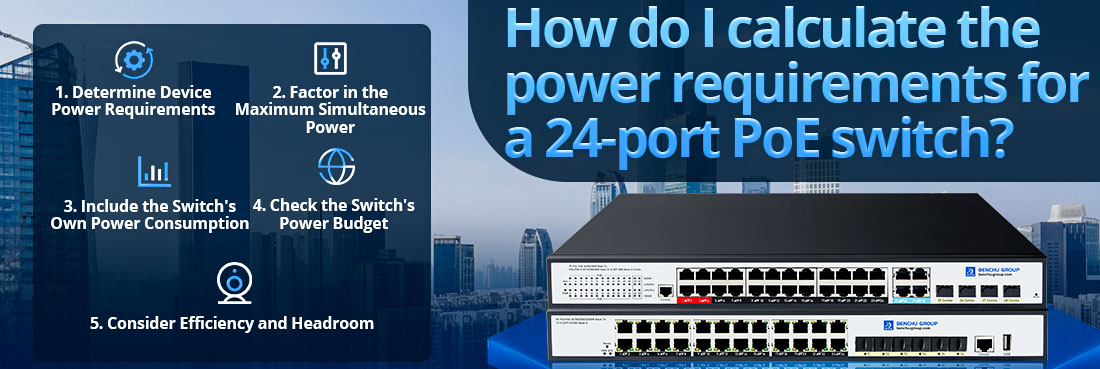
Calculando os requisitos de energia para um dispositivo de 24 portas PoE (Power over Ethernet) O switch envolve a avaliação do orçamento total de energia com base no padrão PoE, no número de portas ativas e em quaisquer demandas adicionais de energia do próprio switch. Aqui está um guia passo a passo:
1. Compreenda os padrões PoE
Diferentes padrões PoE fornecem níveis variados de potência por porta. Aqui estão os padrões comuns:
| Padrão PoE | Energia para dispositivo (PD) | Energia extraída do switch (PSE) |
| IEEE 802.3af (PoE) | 15,4W | 15,4W |
| IEEE 802.3at (PoE+) | 25,5 W | 30W |
| IEEE 802.3bt (PoE++ Tipo 3) | 51W | 60W |
| IEEE 802.3bt (PoE++ Tipo 4) | 71,3 W | 90W |
A "Energia extraída do switch" inclui alguma sobrecarga devido à ineficiência no fornecimento de energia.
2. Determine os requisitos de energia do dispositivo
Cada dispositivo conectado (por exemplo, câmeras IP, telefones VoIP, pontos de acesso sem fio) possui necessidades específicas de energia. Verifique os requisitos de energia de todos os dispositivos conectados e combine-os com o padrão PoE.
--- Por exemplo, se você estiver alimentando 12 câmeras IP que exigem 15,4 W cada e 12 telefones VoIP que precisam de 7 W cada, os requisitos de energia do seu dispositivo serão:
(12×15,4W)+(12×7W)= 184,8W+84W = 268,8W
3. Fatore a potência máxima simultânea
Nem todas as portas podem ser usadas simultaneamente, mas se forem, será necessário calcular o uso máximo.
Para um switch totalmente utilizado:
Energia total necessária = Potência por porta (PSE) × Número × Número de portas
Por exemplo, se todas as 24 portas fornecerem 15,4 W (PoE):
24 × 15,4 W = 369,6 W
4. Incluir o consumo de energia do próprio switch
O próprio switch consome alguma energia para suas operações internas (funções não PoE). Isso normalmente é mencionado nas especificações do switch. Por exemplo, se o switch necessitar de 50 W para funcionar:
Necessidade total de energia = potência PoE Exigência + Alternar consumo de energia
Para o exemplo acima:
369,6W + 50W = 419,6W
5. Verifique o orçamento de energia do switch
Os switches PoE têm um orçamento de energia definido (por exemplo, 400W, 500W, 600W). Certifique-se de que o requisito de energia calculado não exceda o orçamento do switch. Se isso acontecer, você pode:
--- Use menos portas PoE ativas.
--- Opte por um switch com maior orçamento de energia.
--- Implante um injetor midspan para fornecimento de energia adicional.
6. Considere a eficiência e o espaço livre
É uma boa prática deixar uma margem de 10 a 20% para compensar perdas de eficiência e picos de energia inesperados. Por exemplo:
Classificação recomendada da fonte de alimentação = Potência total Requisito × 1,2
Para um requisito de 419,6 W:
419,6 W × 1,2 = 503,5 W
Resumo de exemplo
Se você estiver alimentando 24 dispositivos (12 exigindo 15,4 W e 12 exigindo 7 W), além de um switch consumindo 50 W:
--- Requisito de energia PoE: 268,8 W
--- Consumo de energia do interruptor: 50W
--- Total: 318,8 W
--- Adicionar margem de 20%: 318,8 W × 1,2 = 382,56 W
Escolha uma fonte de alimentação ou Interruptor PoE com um orçamento de energia de 400 W ou mais.
Conclusão
Para calcular os requisitos de energia para um Switch PoE de 24 portas:
1. Determine o padrão PoE e a potência por porta.
2. Some os requisitos de energia de todos os dispositivos conectados.
3. Adicione o consumo de energia do próprio switch.
4. Certifique-se de que o requisito total de energia esteja dentro do orçamento do switch.
5. Adicione uma margem de segurança para levar em conta a eficiência e a carga inesperada.